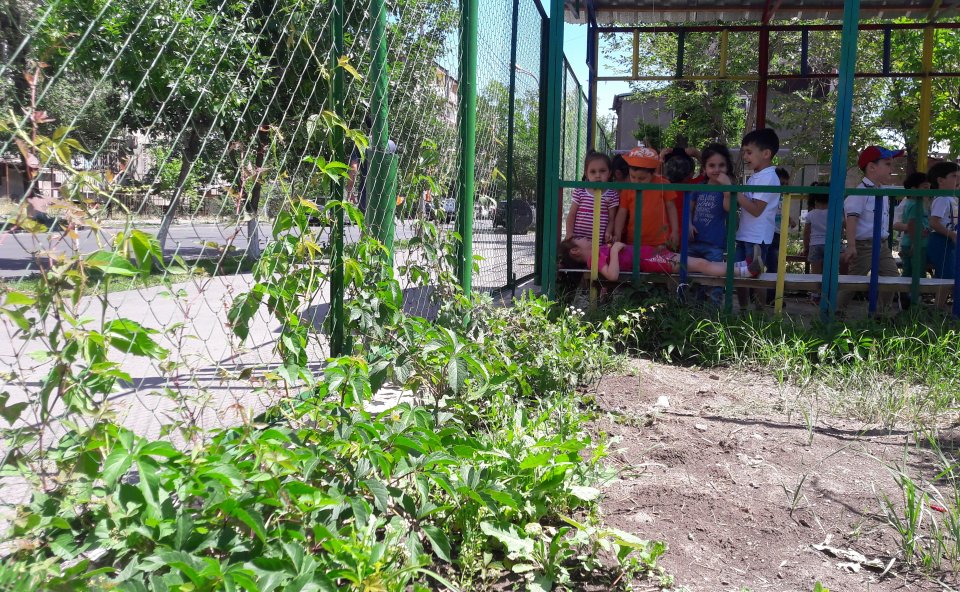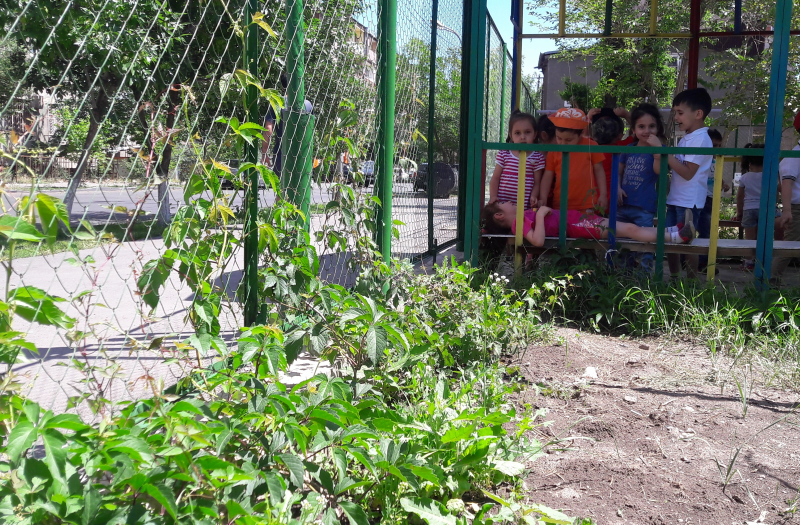Yerevan-Nature-Based Solution: A GREEN WALL FOR KINDERGARTEN

The capital city of the Republic of Armenia - city Yerevan (latitude 40օ10'40''N, altitude 44օ30'45''E) has a total area of 223 km2 and 1.06 million population. Major land use types of the city are primarily residential, industrial, and commercial. Since Soviet times the city was known by the high level of pollution with toxic elements, which still exists in the city environment (https://doi.org/10.1016/j.gexplo.2016.04.006). In the city more than 160 kindergartens are operating and some of them are located in the most polluted part of Yerevan. The study conducted in 2012 showed that more than 100 kindergarten’s territory soils are polluted by a number of toxic elements (https://doi.org/10.1016/j.ecoenv.2017.04.013). Some of these kindergartens are spatially located just in front of street with heavy traffic and do not have any barrier preventing the penetration of pollutants (i.e. vehicular emission) into the kindergarten area.
Challenges
The described situation was an opportunity for the nature based solutions (green wall creation) implementation. Particularly, based on the scientific data available from more than 160 Yerevan kindergartens specific one was identified and selected ensuring the maximum benefits for the kindergarten territory, its sounding and children’s health.
Objective
The testing site - kindergarten was built in former Soviet Union period and did not underwent any reconstruction action. Due to its spatial location the kindergarten is experiencing a significant impact from the heavy traffic from street site and the its territory is open for the migration and accumulation of pollutants into the playground soil layer. The study showed that selected kindergarten soils are highly polluted (https://doi.org/10.1016/j.ecoenv.2017.04.013) and toxic elements pose a risk to children health. Therefore, it is a major challenge to reduce pollution level and prevent further penetration of pollutants into the N143 kindergarten territory regarding, which a nature-based solution was applied.
Financing
The NbS “Green wall for kindergartens” was planned in the frame of H2020 Connecting Nature project (www.connectingnature.eu). The H2020 Connecting Nature project helped to integrate the 'Nature-Based Solution' concept into Green City Action Plan, which articulates a Yerevan’s sustainable development vision, strategic objectives and actions and investments to address priority environmental issues and meet the plan’s objectives (https://www.yerevan.am/en/yerevan-green-city-action-plan/) The funding for the green wall creation was provided by the “Eurasia” CPO (http://eurasia-cpo.com/en/).
The implementation of nature-based solution on the territory of Yerevan has more than 10 years of history. Particularly, according to the Yerevan Municipality request The Center for Ecological-Noosphere Studies (CENS, http://cens.am/) developed a “Target tree...
The green wall in the sounding of N143 kindergarten may ensure sustainable environmental conditions including better air quality in the kindergarten territory. The care of the plant species (Virginia creeper (parthenocissus quiquefolia), Amur grape (vitis amurensis), monkshood vine (ampelopsis aconitifolia)) used for the green wall creation may serve as an excellent platform to teach kindergarten children to love and preserve the environment. The creation of green wall brings together the representatives of local Authorities (Municipality), scientists, NGOs and kindergarten staff and supported to increase the level of local environmental quality and public awareness of nature, to provide aesthetic and health benefits.
The main success factors of nature-based solution implementation were:
- the availability of scientific data on the kindergartens areas,
- effective collaboration of local authorities, scientists and kindergarten staff,
- availability of funds
- time to search for additional funding for other problematic kindergartens and/or territories,
- availability to monitor kindergarten’s territory to reveal the extent of green wall pollution prevention capacity.
The main limiting factors were:
- the time it takes for the Municipality to sign cooperation agreement,
- the lack of financial support from Municipality site,
- lack of funds, which limited the implementation of nature-based solution only in one kindergarten.
The NbS “Green wall for kindergartens” was planned in the frame of H2020 Connecting Nature project. The H2020 Connecting Nature project helped to integrate the 'Nature-Based Solution' concept into Green City Action Plan, which articulates a Yerevan’s sustainable development vision, strategic...
The Center for Ecological-Noosphere Studies (CENS), NAS RA
- : +37410572924
website: http://cens.am/
Email: info@cens.am,...









